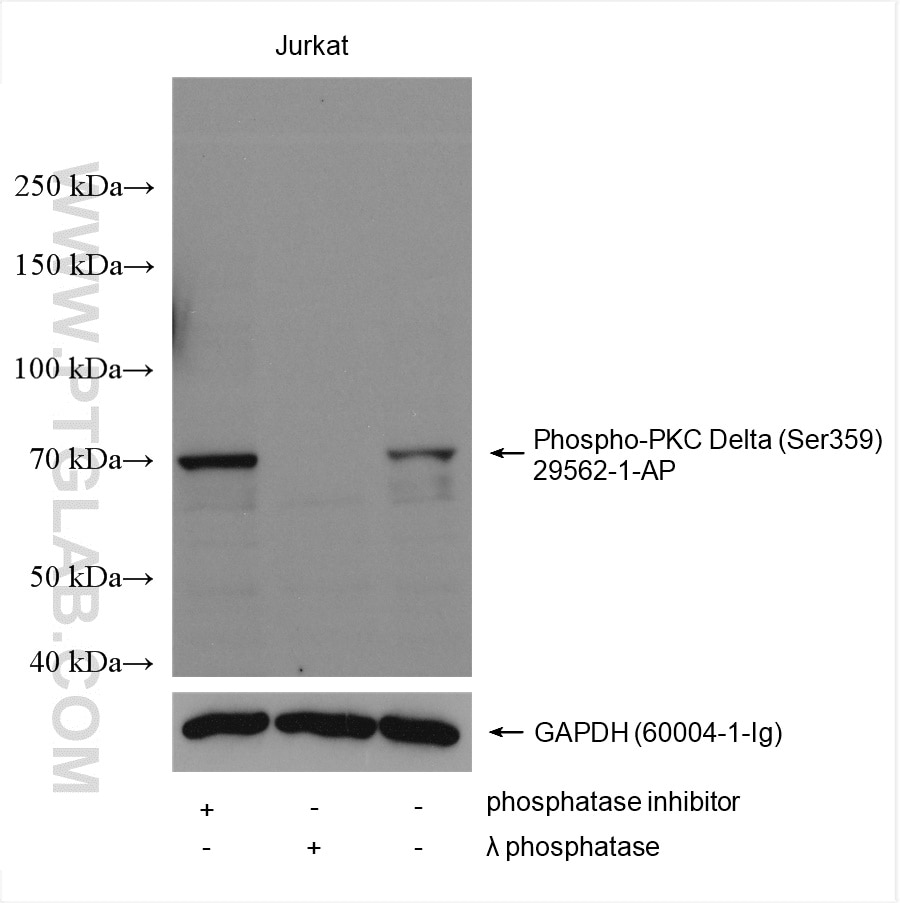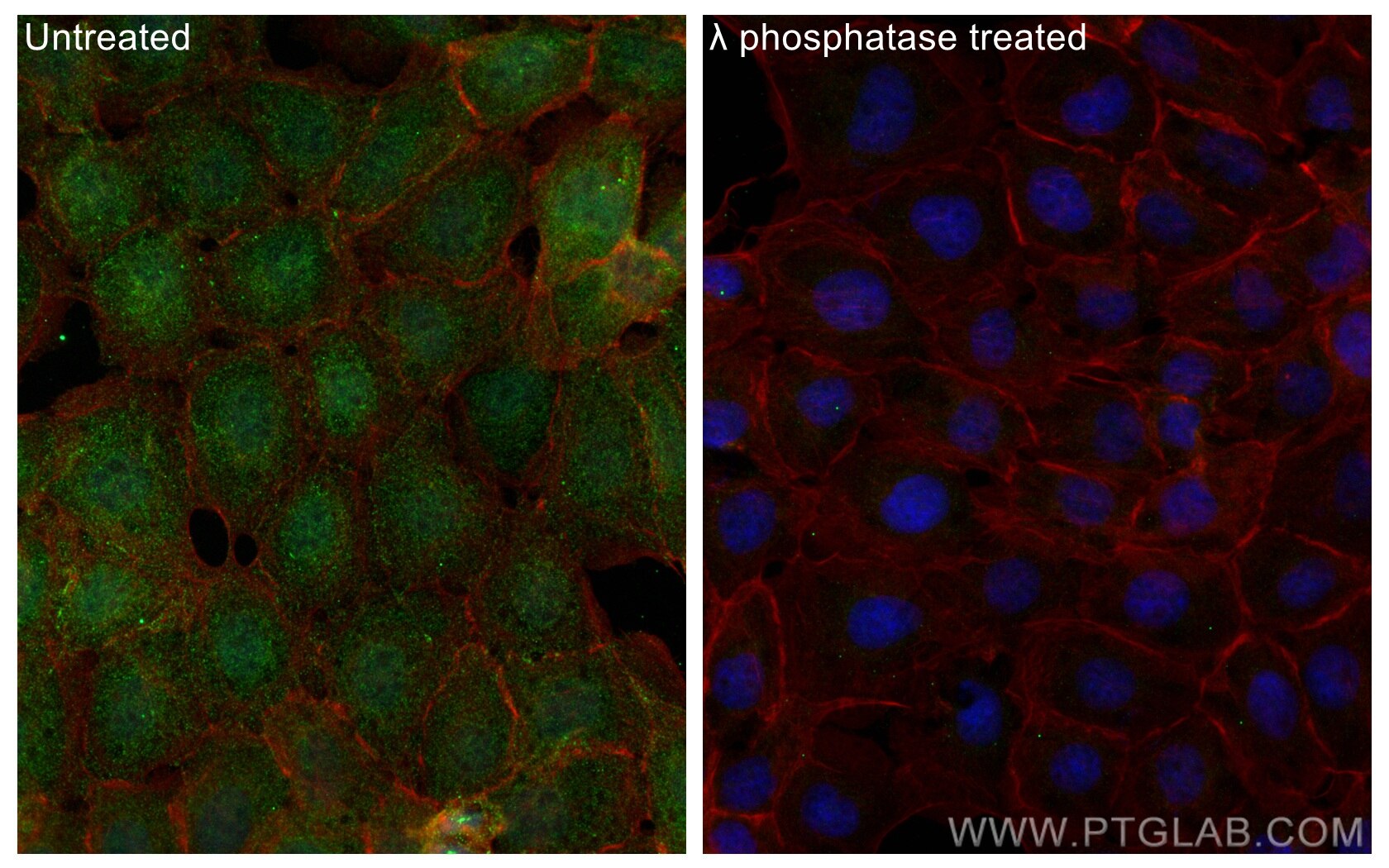Phospho-PKC Delta (Ser359) Polyklonaler Antikörper
Phospho-PKC Delta (Ser359) Polyklonal Antikörper für WB, IF/ICC, ELISA
Wirt / Isotyp
Kaninchen / IgG
Getestete Reaktivität
human und mehr (2)
Anwendung
WB, IF/ICC, ELISA
Konjugation
Unkonjugiert
Kat-Nr. : 29562-1-AP
Synonyme
Geprüfte Anwendungen
| Erfolgreiche Detektion in WB | mit λ-Phosphatase behandelte Jurkat-Zellen |
| Erfolgreiche Detektion in IF/ICC | λ phosphatase treated A431 cells |
Empfohlene Verdünnung
| Anwendung | Verdünnung |
|---|---|
| Western Blot (WB) | WB : 1:500-1:1000 |
| Immunfluoreszenz (IF)/ICC | IF/ICC : 1:50-1:500 |
| It is recommended that this reagent should be titrated in each testing system to obtain optimal results. | |
| Sample-dependent, check data in validation data gallery | |
Veröffentlichte Anwendungen
| WB | See 1 publications below |
Produktinformation
29562-1-AP bindet in WB, IF/ICC, ELISA Phospho-PKC Delta (Ser359) und zeigt Reaktivität mit human
| Getestete Reaktivität | human |
| In Publikationen genannte Reaktivität | Maus, Ratte |
| Wirt / Isotyp | Kaninchen / IgG |
| Klonalität | Polyklonal |
| Typ | Antikörper |
| Immunogen | Peptid |
| Vollständiger Name | protein kinase C, delta |
| Berechnetes Molekulargewicht | 78 kDa |
| Beobachtetes Molekulargewicht | 70 kDa |
| GenBank-Zugangsnummer | BC043350 |
| Gene symbol | PKC Delta |
| Gene ID (NCBI) | 5580 |
| Konjugation | Unkonjugiert |
| Form | Liquid |
| Reinigungsmethode | Antigen-Affinitätsreinigung |
| Lagerungspuffer | PBS with 0.02% sodium azide and 50% glycerol |
| Lagerungsbedingungen | Bei -20°C lagern. Nach dem Versand ein Jahr lang stabil Aliquotieren ist bei -20oC Lagerung nicht notwendig. 20ul Größen enthalten 0,1% BSA. |
Hintergrundinformationen
Protein kinase C (PKC) was initially identified and characterized as a protein hydrolysis-activated kinase called protein kinase M. It has been established that PKC is a family of at least 12 serine/threonine kinases that is divided into three subfamilies: The classical PKCs (α, β1, β2, and γ), which are activated by diacylglycerol (DAG) and calcium; the novel PKCs (δ, ε, η, and θ) which are activated by DAG; and the atypical PKCs (ζ and λ/ι), which respond to neither DAG nor calcium. PKCδ, unlike other members of the PKC family, is unique in its regulation by tyrosine phosphorylation on multiple sites that determine activation, localization, and substrate specificity. PKCδ is activated by inflammatory mediators involved in the inflammatory response including lipopolysaccharide (LPS), tumor necrosis factor (TNF) and interleukin-1 (IL-1). PKCδ activation requires multi-phosphorylation steps which triggers translocation from the cell cytosol to different subcellular compartments. (PMID: 30095599, PMID: 31323909, PMID: 30917487)
Protokolle
| PRODUKTSPEZIFISCHE PROTOKOLLE | |
|---|---|
| WB protocol for Phospho-PKC Delta (Ser359) antibody 29562-1-AP | Protokoll herunterladen |
| IF protocol for Phospho-PKC Delta (Ser359) antibody 29562-1-AP | Protokoll herunterladen |
| STANDARD-PROTOKOLLE | |
|---|---|
| Klicken Sie hier, um unsere Standardprotokolle anzuzeigen |



